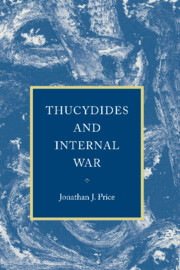4 - The failure of communication
Published online by Cambridge University Press: 22 September 2009
Summary
When words are given new evaluations and the community, κοινωνία, has undergone radical redefinition by contending parties – that is, when the first two phenomena of stasis rhetoric have manifested themselves – communication breaks down. People who in the past had shared language, religious beliefs and practices, moral systems, and social and political institutions, not only stop sharing all those elements of mutual identity but also lose the ability to understand each other – even when they want to – once those bases for mutuality disappear. Words, aside from failing as a vehicle for mutual comprehension, become another violent and especially treacherous weapon in the arsenals of the contending factions. We shall study two examples of this in the History.
ATHENS AT SPARTA
Many of the speeches we have discussed so far demonstrate the failure of two parties to communicate. The Plataeans failed to make the Spartans understand them in their own terms; the Spartans used the wrong arguments at Athens. The first, and one of the best examples of failed communication appears in the debate at Sparta before the war, when Thucydides first gives the Athenians full voice (1.73–8).
- Type
- Chapter
- Information
- Thucydides and Internal War , pp. 190 - 204Publisher: Cambridge University PressPrint publication year: 2001



